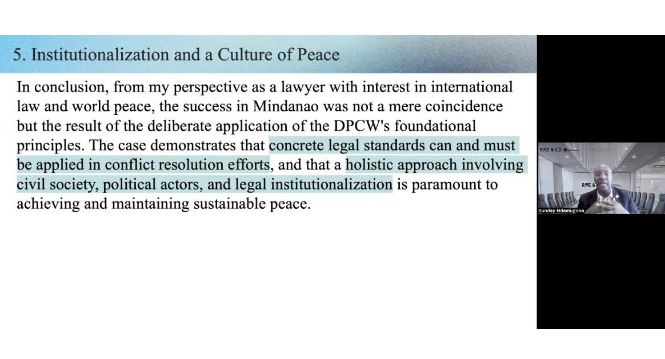As of 2024, the DPCW has received support from over 170 countries, including endorsements from past and present heads of state, legal experts and civil society leaders, it has been learned.
At the DPCW Academic Conference on June 27, 2025, which was held online and organized by HWPL, it was stated that the DPCW is supported by many countries due to their non-conformity with war.
The conference, attended by international legal experts, scholars and members of civil society, served as a platform to explore the value of the DPCW.
The main focus of the event was the Declaration on Peace and the Cessation of War, a legal document drafted by international legal experts. It emphasizes the prohibition of the use of force, conflict prevention and a culture of peace through education and public participation.
The event, which began with an overview of the HWPL and the background to the DPCW, was followed by a presentation on the current status and procedures for submitting the declaration as a UN resolution.
The program continued with a case study of the Mindanao peace agreement in the Philippines, where more than four decades of armed conflict between government forces and a Muslim separatist group ended in 2014 through a civilian-led process involving religious leaders and legal experts.
The Vice-Chancellor of the Faculty of Law at Haramaya University (Ethiopia), Mr. Deril Workicho Hussen, said, Peace cannot be imposed from the outside, it must be driven by the direct participation of stakeholders and accompanied by structural changes within society.
He said that instead of copying the Mindanao model, it is important to recognize the standards that can be adapted to the unique context of Ethiopia.
The Senior Officer of the Ministry of Peace (Ethiopia), Mr.
Ahmed Sayed said the DPCW provisions could serve as a valuable reference for institutional approaches to internal conflicts in Ethiopia.
He said a partnership framework between regional governments and a foundation based on civil society must be developed at the same time.
The Deputy Minister of Justice of Lebanon, Mr.
Meissam Nouairi said As in the case of Mindanao, where rebuilding trust between religious communities was a key issue, countries with complex social conflicts must connect legal, religious and civil networks.
The President of the MENA Urban Lawyers Association (Lebanon), Mr. Fadi Jamaleddin shared, “International law is especially effective when internalized and the DPCW provides a framework for formalizing mediation and dialogue.
HWPL plans to revise its existing peacebuilding frameworks, which have been refined through various regional forums and through participatory mechanisms.
It said that to this end, it will initiate structured dialogues with academic institutions, government agencies, and international organizations to identify context-specific strategies for implementing sustainable peace.
HWPL stressed that collaborative dialogue with relevant stakeholders is essential to ensure real and actionable outcomes.
In previous initiatives, HWPL has collaborated with institutions such as Haramaya University, the Ministry of Peace, the Ethiopian International Institute for Peace and Development, and the Addis Ababa University School of Law.
These collaborations have included legal seminars, academic forums, and joint peace education efforts under HWPL’s “Legal Peace” campaign.
HWPL Ethiopia said it aims to continue engaging stakeholders in national and African Union (AU) to explore the domestic application of international peace principles through dialogue-based policymaking.




